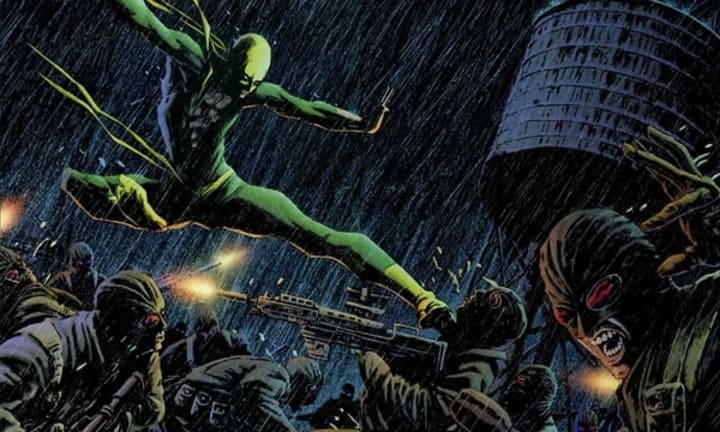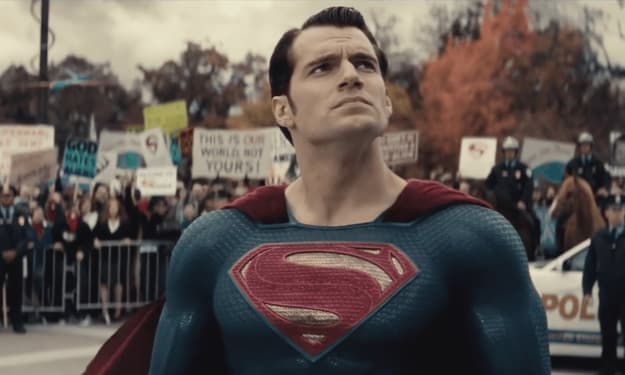Why Comic Book Movie Heroes Highlight the Current Casting Crisis
Minorities are not being casted as leads in comic book movies; people of colour are not sharing the same voice.

I’d like to again state that as a white male, I’m only exploring these issues with my current understanding and perception of them.
The fallout still continues from the 88th Academy Awards Ceremony; from the rage over certain snubs to the sad loss of the Leo/Oscar meme, there has been plenty to discuss, but front and centre of the event was the racial row which host Chris Rock was only too happy to acknowledge.

Criticism leveled at the protesters essentially boiled down to several beliefs: that it was pettiness, problem causing and reverse racism.
Many accepted the idea that Will Smith wasn’t attending simply because he didn’t receive a nod for his movie Concussion (2015). Alongside some casual racism, there were also concerns that creating awards just for actors and actresses from minority groups would only exacerbate tensions.
The latter is indubitable, and no one is suggesting that that should be the case; this challenge to the Academy’s processes only hints at the inequalities that are inherent within the system itself. The Academy may reinforce these archaic ways, but it is by no means the source.

In essence, it is the representation of all creeds and colours that is needed, right from production level through to the talents that we see and hear on screen; yes, we do see black actors, Latino actors and lesbians for example, but how often do they conform to stereotypical models?
How often is a black person portrayed as a variation of thematic or literal support to a white protagonist, comic relief or a criminal?
Positive, leading roles in popular entertainment are few and far between; denouncers of the protest, many of which are white, arguably fail to see this side of things. It’s not merely that they play second fiddle to the white leads, but the fact that through Hollywood itself, people of colour do not have the same voice.

A comparable example is hard to come by or state without causing offence, yet it’s arguable that the furore generated by the World War 2 movie U-571 (2000) could be applied.
The film depicts American submariners stealing an Enigma machine from a German vessel, yet in reality it was British personnel who accomplished this task. Conversely, if a film was made which depicts a group of British soldiers winning a major battle in the Vietnam War, I'm guessing that the feeling would be somewhat similar.
Both examples have/would exclude the experiences of the true participants in each conflict and would be a distorted representation of history; though the situation is different, by downplaying the diversity of modern, multicultural society by focusing on white male characters and marginalising actors, actresses, directors and screenwriters from different races and backgrounds for example, this dissatisfaction and misrepresentation is only increased.
It isn’t a recent phenomenon by any means, but if we need a relevant example, we have only to look to the most popular entertainment, because of its appeal to the largest denomination of viewers is naturally the best place to spot trends.

The Immortal Iron Fist
Superheroes are the dominant tent pole output of these past few years, and thus, we seen this sort of debate inflamed in the casting for Marvel & Netflix’s Iron Fist superhero series.
Iron Fist, or Danny Rand is a superhero who is a skilled martial artist and wields a mystical force which allows him to focus his chi into his hands, making them super strong (from which his name derives).
Acquired from a mystical city called K'un-L'un, Iron Fist will be portrayed by British actor Finn Jones (who is known for his role as Ser Loras Tyrell on Game of Thrones) in the upcoming series.

Finn Jones in Game of Thrones.
I’m less familiar with Iron Fist than I am with many other Marvel heroes, yet the kung fu basis of his powers and the fact that K'un-L'un is located in Tibet raises several issues concerning orientalism, which is a stereotypical representation of Asia from colonial times so that it appears socially and technologically less developed, with its people appearing as offensive caricatures or subservient to Westerners.
Indeed a wealthy white man, coming to a benevolent Asia to lean only a specific and marketable part of their culture, only to sideline the country and return as to America as a skilled champion, is a somewhat exploitative storyline.
You may think that the story sounds familiar, and yes, it featured Batman Begins (2005) when Bruce Wayne travels abroad and is taught by Ra's al Ghul (Ken Watanabe/Liam Neeson), but this movie neatly sidesteps this issue by using decoys and different identities.

Batman Begins (2005)
However, any Asian influence and culture is dissipated in the process.
From what I have read, a major facet of Danny Rand’s journey is that he is an outsider within a foreign land and lifestyle; being white certainly differentiates him from his surroundings but is it necessarily a fixed part of his character identity?
The counter to changing his race is that if he was played by an Asian actor (the seemingly preferred choice), as a martial arts expert he could become a racist caricature.
But if he was played by an America black or Latino actor, would it not be the same as if he was white? A young man of any of these races would naturally be out of place if he was dropped down into a magic city.
Or, as some have suggested, if he was an Asian-American actor, there could be some interesting discussions concerning Rand’s rediscovery of his ancestry; certainly the Netflix platform would allow these discussions, since especially in Jessica Jones they have been happy to expand the discussions of rape, abuse and feminism.
Not limited to television series however, Marvel incited controversy with their upcoming Doctor Strange movie (2016), when they cast Tilda Swinton as Stephen Strange’s (Benedict Cumberbatch) teacher The Ancient One, who traditionally was portrayed as a stereotypical, stock Asian mentor.

Again, change was necessary to update the story to 21st century attitudes, and the character’s different gender is progressive to some, but the fact that an Asian character has been whitewashed is the aspect which many take issue with.
Could Marvel have paid greater attention to the writing to ensure that The Ancient One did not pertain to old clichés? They certainly attempted to with The Mandarin reveal in Iron Man Three (2013).
This isn’t to say that Marvel has not been making attempts to change their sources races, with Samuel L Jackson playing Nick Fury, the inclusion of both Terrence Howard and Don Cheadle as War Machine and Vondie Curtis-Hall as Ben Urich in Netflix’s Daredevil; though War Machine is black in the comics, you might argue that the race changes of Nick Fury and Ben Urich (who are both originally white) is progressive, but again they don’t stand on the same level as the main hero.
As popular as the characters are, they fill out the supporting cast, and aren’t placed centre stage.

What works well in these instances however is that there is no major edit that is made to their back-story to facilitate it; there are always discrepancies between comic books and their movie adaptations, but if Luke Cage (Mike Colter in Jessica Jones, as well as his own upcoming series) and his powers were changed for example, he would lose a great amount of the allegory embedded in his story and thus detract from the years upon years of canon.
Then another question presents itself: how far should canon be respected? Naturally, many of the stories which feature inside it have made the character as beloved as they are, but if the overall personality, structure and tone were kept the same, what could be edited to better representation?
Would Marvel cast a person of colour as Spider-Man, or Captain America? They have done so in the comics, with Miles Morales becoming the Ultimate Spider-Man, and Sam Wilson/ The Falcon assuming the mantle when the original Cap was incapacitated.
But then, that could generate the racist backlash, often disguised a comic book–purism that Idris Elba and Michael B. Jordan faced when they were respectively cast as Heimdall and The Human Torch.

F4ntastic (2015)
Though comic book TV shows and movies are slowly diversifying, Hollywood has had problems with its representation for years, seemingly believing that whitewashing is more palatable for its audiences, but by doing so they erase people of colour from the movie in the process.
We only have to look at Joseph Fiennes’s casting as Michael Jackson in the upcoming Elizabeth, Michael & Marlon to see that this continues even in recent months; this is an ingrained practice, from Johnny Depp‘s Tonto in The Lone Ranger in 2013, all the way through to Mickey Rooney’s yellow face in Breakfast at Tiffany’s in 1961, and beyond.
Furthermore, we’re only talking about actors and actresses of colour, and not even referred to different sexualities, identities and disabilities; Tom Hooper’s movie The Danish Girl (2015) was attacked because of the appointment of Eddie Redmayne as the famous transsexual Einar Wegener / Lili Elbe, over many other, lesser known transsexual candidates.

The Danish Girl (2015)
Though he attempted to assuage the disapproving grumbles, the 33 year old Redmayne was quick to point out that “... I've just played a man in his fifties with motor neurone disease. I'm acting.”
Whilst his statement does have a point about the nature of the profession itself, it fails to address what little opportunities racial and sexual minorities have in mainstream entertainment.
We can obviously list white and black actors and actresses, and various white homosexual actors and actresses but beyond Laverne Cox and several other transgender figures, our knowledge starts to dry up.
It is the same thing for those who are handicapped; actors and actresses win awards for playing people with different abilities, rather than these groups of people appearing themselves in cinema.
Maybe, as some have suggested online, that in the case of superheroes and beyond, the focus should not be on converting or modernising these roles, but leaving them behind and creating new ones.
Yet in the wake of such arrangements as The Danish Girl’s, which we would expect to be tailor made for an up-and-coming transgender actor or actress, Hollywood appears to be stuck in its ways and any immediate change looks unlikely.

Exodus: Gods and Kings (2014)
The fact is that the figures behind big budget drama or tent pole releases rarely pluck relative unknowns from obscurity; though Star Wars: The Force Awakens (2015) could afford to do this through the huge recognition of its brand alone, other movies, as Ridley Scott somewhat bluntly pointed out in the wake of the Exodus: Gods and Kings (2014) whitewashing scandal “I can’t mount a film of this budget, where I have to rely on tax rebates in Spain, and say that my lead actor is Mohammad so-and-so from such-and-such,” Scott says. “I’m just not going to get it financed. So the question doesn’t even come up.”
Therefore, it is a deeper issue altogether.
Conclusion
As a person who has not read or seen Iron Fist, I'm not taking shots at it before it airs; Marvel and Netflix haven't made a wrong move casting wise, and I'm sure that Finn Jones will deliver a solid performance, but all the same, he is another white hero in a seemingly Caucasian-dominated fictional universe, until the likes of Luke Cage and Black Panther (2018) arrive that is!

Modern western society is no longer simply white and heterosexual, with the same strengths and weaknesses; indeed, the idea that it always has been is incorrect and nonsensical, founded upon outmoded ideas that the media perpetuated at the time.
Therefore, the system does need a shakeup, from the drama schools to the agencies and the casting directors, not to create token roles or specifications for entertainment, but to increase diversity and inclusion by creating more opportunities for those groups we have not heard from as much as we should.
If Hollywood and the entertainment industry still wish to appeal to audiences with evolving tastes, then its output should reflect the society that it is being tailored to.

About the Creator
Max Farrow
A fanatical film-watcher, hill-walker, aspiring author, freelance writer and biscuit connoisseur.
These articles first appeared on Movie Pilot between Jan 2016 and Dec 2017. Follow me on Twitter @Farrow91






Comments
There are no comments for this story
Be the first to respond and start the conversation.